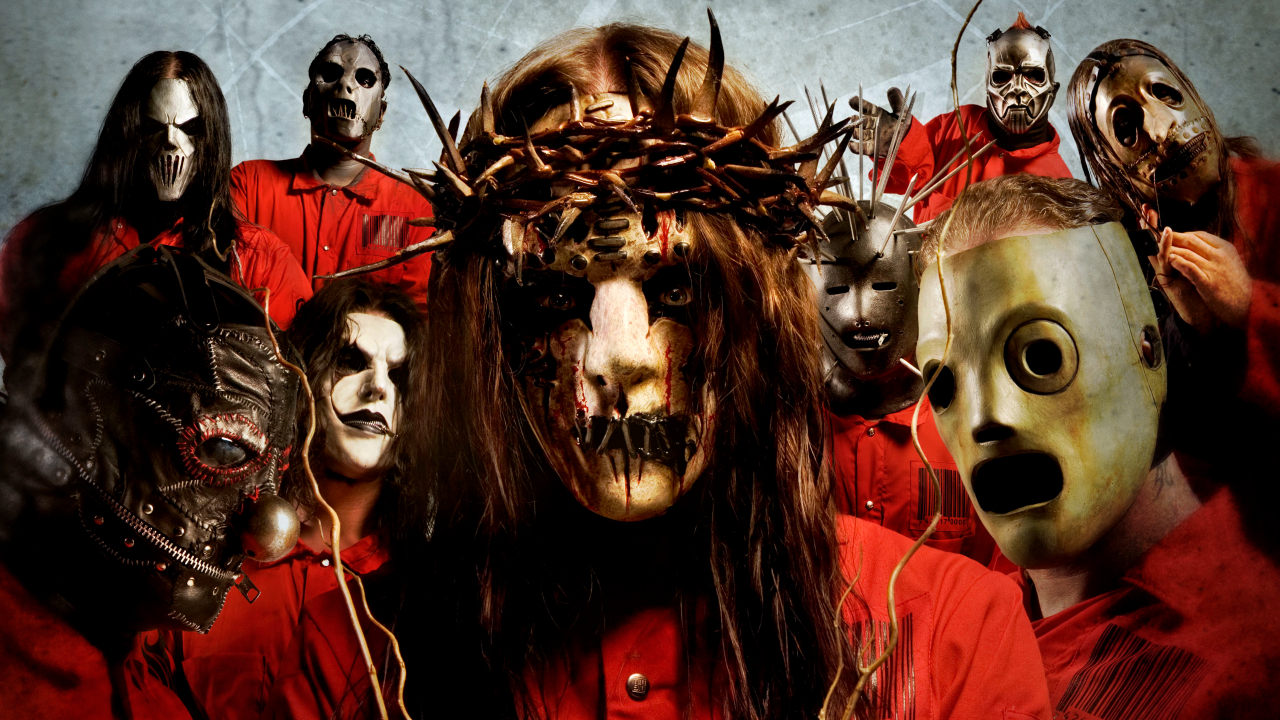If you were to time-warp back to 2001 and tell people that Slipknot will create one of the most vulnerable and evocative ballads in metal, they’d laugh in your face. The Nine rocketed to prominence around the new millennium by being the angriest band of the nu metal takeover: their music was extreme, their live shows anarchic and their appearance deliberately shit-your-pants terrifying. However, continued relevance requires musical evolution – and that’s precisely what the Des Moines renegades underwent as the noughties resumed.
After putting the metal world on notice with their furious debut then doubling down on Iowa (still the angriest album to top the UK charts), Slipknot grew beyond unfettered rage. Members took breaks from the 18-armed wrecking machine in less destructive side-projects and/or got clean from substances. When they regrouped to make 2004’s Vol. 3, they craved acoustic guitars, bigger singalongs and a more colourful emotional palette. That pursuit then reached its apex four years later, with the creation of the band’s softest and most emotionally exposed song: Snuff.
Snuff was controversial at first. When released as the 11th song of Slipknot’s fourth album All Hope Is Gone, reviewers were apprehensive, while fans were either confused or incensed. Many likened its melodic singing and clean guitar tones to Corey Taylor’s hard rock second job Stone Sour. Others, even worse, lambasted the ballad as a sellout move, mocking what were once metal’s rowdiest iconoclasts for lamenting a breakup with lyrics like “It took the death of hope to let you go”.
However, Snuff has since been reappraised as one of Slipknot’s greatest achievements. Its release as a single in 2009, with a cinematic music video directed by percussionist Shawn “Clown” Crahan, broadened the band’s appeal and saw it resonate with anyone who’s felt emotions as universal as heartbreak or self-loathing. In 2023, The Nine were forced to add the ballad to their setlist – such was the intensity of fans demanding to hear it live.
In much the same way Snuff was unusual for Slipknot musically, its songwriting was different to how The Nine normally operated. Late bassist Paul Gray and drummer Joey Jordison were the outfit’s principal composers, especially during the volatile sessions for Vol. 3, but the roots of this song were solely with Corey.
“I get into arguments with fans all the time about this: everybody’s like, ‘Oh, it’s just a leftover Stone Sour song,’” the singer recalled during a 2021 fan Q&A. “No, I wrote that for Slipknot. I didn’t expect them to use it, to be honest, but I wrote it specifically for Slipknot, because it was regarding one of the heaviest times of my life.”
Snuff directly addresses Corey’s emotions at the end of his first marriage, which lasted from 2004 to 2007. “It was one of the heaviest disappointments, one of the heaviest heartbreaks, I’d ever felt,” he said of the split. “It took years to get through, even after moving on and being in different relationships. That haunted me for a long time. It’s one of those things where you knew you weren’t supposed to be together, but there was something there that felt so good. When it’s ripped away from you, you just feel like there’s a hole in your chest.”
The lyrics unpick the complexity of that: ending a relationship where there’s disappointment and hurt yet, also, still affection. “If you love me, let me go,” Corey declares at the start of the second verse, later adding juxtapositions like “You couldn’t hate enough to love” and “Angels lie to keep control”.
Although Corey never expected Slipknot to go for the song, Joey and Paul were hugely impressed by it. Joey secretly recorded a drum track to accompany the frontman’s demo and, when he presented the new package to Corey, the singer burst into tears. Meanwhile, the bassist was an ardent supporter of the tender track to the rest of the band.
“If Paul hadn’t championed that song, I don’t think we would have recorded it,” Corey told Kerrang! in 2018. “But he loved it and saw the potential with it and really wanted us to do it.”
Despite the initial shaky response to Snuff when it was first heard on All Hope Is Gone, its re-examination started as soon as its single release. The song made it to number six on the US Hot Rock & Alternative Songs chart, a career-best that the band didn’t outdo until 2019’s Unsainted, and number two on the US Mainstream Rock chart. It’s nowadays the second-most-streamed All Hope Is Gone song (behind Psychosocial), while the video currently boasts 163 million YouTube views, which is more than such beloveds as Wait And Bleed and Left Behind.
Beyond cold, hard numbers, Snuff also gained newfound sentimental power following the death of Paul in May 2010, aged 38. The late bassist’s diehard support for the song saw Corey play it to him as a tribute during his solo shows. In this new context, the heartbroken lyrics were reapplied from a breakup to an untimely passing, and videos of Corey getting emotional while singing them went viral in the 2010s, reasserting its emotional impact.
“When Paul passed, the song suddenly became less about the dark side of love and it became about triggering memories of him,” Corey told the BBC Radio 1 Rock Show in 2017. “He loved that song, so it really reminds me of him, especially when I play it live. It’s strange there are a lot of times where I can’t even remember the level of potency that maybe the original emotion had when I recorded it – it just means something different now.”
Today, Snuff remains both a potent tribute and one of metal’s most adored ballads. No, the Slipknot of 2001 could not, and would not, have written something this sensitive and exposing. But that only makes the song a testament to the fact that – beyond playing guitar or having a nice voice – one of the key skills of excellent musicians is personal growth.


